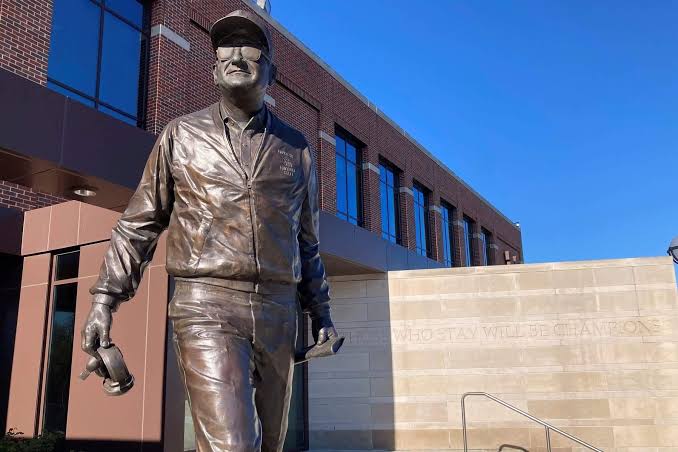Michigan Wolverines Legendary Coach Bo Schembechler Honored with Statue in His Hom…

Michigan Wolverines Legendary Coach Bo Schembechler Honored with Statue in His Hometown
In a heartfelt tribute to one of college football’s most revered figures, a statue of legendary Michigan Wolverines head coach Glenn Edward “Bo” Schembechler has been unveiled in his hometown of Barberton, Ohio. The ceremony, which drew hundreds of fans, former players, and local dignitaries, celebrated not only the iconic coach’s contributions to the University of Michigan football program but also his enduring legacy in the world of college sports and leadership.
Born on April 1, 1929, in Barberton, Ohio, Bo Schembechler became a towering figure in American football history through his unparalleled leadership, discipline, and commitment to excellence. The statue unveiling marked a significant moment for the town of Barberton, which proudly claims Schembechler as one of its most accomplished sons. Positioned prominently in a newly renovated public square, the statue captures Bo in his classic coaching stance—hat pulled low, clipboard in hand, and a stern yet determined expression that so many Wolverines remember.
Bo Schembechler coached the Michigan Wolverines from 1969 to 1989, compiling a remarkable record of 194 wins, 48 losses, and 5 ties. Under his leadership, the Wolverines secured 13 Big Ten Conference titles and went to 17 bowl games. But beyond the numbers, Schembechler’s tenure was marked by a resurgence in the Michigan football program’s national stature. His emphasis on toughness, discipline, and team unity revitalized a program that had been struggling before his arrival.
One of the most defining aspects of Bo’s career was his intense rivalry with Ohio State, particularly during the years when Woody Hayes was the Buckeyes’ head coach. Dubbed “The Ten-Year War,” the series of games between 1969 and 1978 became the stuff of legend, epitomizing the fierce competition and mutual respect between two of college football’s greatest minds. The rivalry helped elevate the Michigan–Ohio State game into a national spectacle and remains one of the most storied matchups in sports history.
The statue unveiling event was a poignant reminder of Schembechler’s deep roots and the wide-reaching impact of his career. Former Michigan players who played under Bo—including NFL stars and prominent alumni—spoke passionately about the values he instilled in them. “Bo taught us more than football,” said former quarterback Jim Harbaugh, who also followed in Schembechler’s footsteps as Michigan’s head coach. “He taught us about accountability, character, and perseverance. This statue represents more than a man; it represents a philosophy and a way of life.”
Barberton officials also spoke of Bo’s impact beyond the gridiron. “He was a hometown hero, but his influence reached far beyond the football field,” said Mayor William Judge. “We’re proud to honor Bo not just as a coach, but as a symbol of leadership, integrity, and Barberton’s enduring spirit.”
The bronze statue was commissioned by local sculptor Daniel Fenwick, who worked closely with the Schembechler family and former players to ensure its authenticity. Fenwick described the creative process as “a labor of love,” saying, “I wanted to capture Bo’s strength and intensity, but also the heart that beat beneath that tough exterior.”
Bo Schembechler passed away in 2006 at the age of 77, just one day before the highly anticipated Michigan–Ohio State game that year. His death marked the end of an era, but his teachings, philosophy, and leadership style continue to influence generations of coaches and players. In 2011, Michigan renamed its football team headquarters the “Schembechler Hall” in his honor, further cementing his legacy in Ann Arbor.
Now, with the unveiling of this new statue, his legacy is enshrined not only at Michigan but also in his hometown, where the seeds of his greatness were first planted. The statue stands not just as a monument to a legendary coach, but as an emblem of determination, leadership, and hometown pride.
Schembechler’s famous motto, “Those who stay will be champions,” is engraved at the base of the statue—a timeless message that continues to inspire athletes, students, and leaders alike. The unveiling served as a powerful reminder that Bo Schembechler’s influence is far from over. In Barberton, in Ann Arbor, and across the landscape of college football, his legacy lives on.
